Library of Congress Cataloging-in-Publication Data
Names: Backstrom, Laura, author.
Title: Weighty problems : embodied inequality at a childrens weight loss camp / Laura Backstrom.
Description: New Brunswick : Rutgers University Press, [2019] | Includes bibliographical references and index.
Identifiers: LCCN 2018022089 | ISBN 9780813599120 (cloth) | ISBN 9780813599113 (paperback)
Subjects: LCSH: Obesity in childrenPsychological aspects. | Weight lossPsychological aspects. | Body image in children.
Classification: LCC RJ399.C6 B33 2019 | DDC 618.92/398dc23
LC record available at https://lccn.loc.gov/2018022089
A British Cataloging-in-Publication record for this book is available from the British Library.
Copyright 2019 by Laura Backstrom
All rights reserved
No part of this book may be reproduced or utilized in any form or by any means, electronic or mechanical, or by any information storage and retrieval system, without written permission from the publisher. Please contact Rutgers University Press, 106 Somerset Street, New Brunswick, NJ 08901. The only exception to this prohibition is fair use as defined by U.S. copyright law.

The paper used in this publication meets the requirements of the American National Standard for Information SciencesPermanence of Paper for Printed Library Materials, ANSI Z39.48-1992.
www.rutgersuniversitypress.org
Manufactured in the United States of America
The children awake in their bunk beds to the squeals of campers chasing each other to communal bathrooms. Near their cabin is a fire pit with the charred remains of last nights campfire where they had spent the evening hours singing songs and impersonating the counselors. Down the dirt path about a half mile is a lake with a dock and large inflatables where the children will splash around in the still chilly water later that day. Spread across the 600 wooded acres of the campground, there are arts and crafts buildings, a ropes course, a dining hall, open fields, basketball and tennis courts, and two pools. It is the quintessential summer camp, a rite of passage for thousands of American children.
Yet these campers differ in one key way: they came to Camp Odyssey to lose weight. Unlike other summer camps, Odyssey campers are given a pretest that includes measures of their height, weight, body mass index (BMI), body fat percentage, blood pressure, and the circumference of five parts of their body as well as fitness tests. Camp Odyssey is a weight loss camp located in a midwestern town that draws thousands of visitors to its waterparks and tourist attractions during the summer. A few miles from the souvenir shops and restaurants of downtown is Camp Jay, a large campground that is operated by the Jewish Community Center (JCC) of a nearby city. Camp Odyssey is embedded in this larger camp, but it is not affiliated with the JCC. For the past decade, Fay and Steve, the married camp directors of Odyssey, have rented a small number of cabins for their twenty to forty participants and paid for the use of Camp Jays facilities and dining services. Odyssey campers follow a separate program of activities and have little interaction with Jay campers.
On this June morning during the first week of camp, the campers change into T-shirts and athletic shorts, fill their water bottles, and head to the dining hall for breakfast. Hundreds of Camp Jay campers are already there. There are long tables at the front of the room filled with a buffet of breakfast items, including pastries, sugary cereals, tubs of peanut butter and jelly, and fresh fruit. The Odyssey campers sit at the four tables designated for them. A counselor brings over a sample plate to show the campers which foods they can eat from the buffet and the portion sizes they should take. The campers eat carefully portioned meals totaling about 1,800 calories per day.
Following breakfast, the campers go to Odyssey Time, which consists of three forty-five-minute rotations. One rotation, a weight loss information session, is called Education and is nearly always led by Fay, the camp codirector. The second rotation is Movement, a structured exercise class such as kickboxing, yoga, or dance. The third rotation can consist of a guest speaker on nutrition, a body image workshop, a self-defense class, or fitness tests. Campers stay at camp for two weeks or a month. For the first two weeks, campers are divided into three groups: older girls, younger girls, and boys. During the second two weeks, the number of campers is small enough that they are simply divided into two groups based on gender.
After Odyssey Time, the campers walk to the gym where they play dodgeball before going to lunch at the dining hall. After lunch, they change into their swimsuits and head to the pool, where the boys play an aggressive game of basketball in the shallow end while the girls play Marco Polo in the deep end. Still in their swimsuits, the campers walk to the lake where they have a snack of pita chips, vegetables, and hummus. At 5 P.M. , they go back to their cabins to change for a cookout at the picnic grove. After they eat grilled chicken and vegetables, the counselors go around with face paint. In the evening, they have a social activity, such as karaoke, movie night, or a camp dance. On this particular night, they paint murals to decorate their cabin doors and invent cabin nicknames like The Extreme Eight. By 8:30 P.M. , the counselors usher them back to the cabins for showers and quiet time before lights out at 10 P.M.
In many ways, this June day was a typical day at a typical summer camp. In other ways, the campers were engaged in a program of bodily and self-change that was anything but ordinary. Although several weight loss camps have operated for decades, the growing acceptance of intensive weight management programs for children is directly linked to more recent concernseven panicabout childhood obesity. As children are exposed to messages about weight control at earlier ages, antiobesity programs have become important sites of cultural meaning about body size. Thousands of children have attended one of the approximately two dozen summer weight loss camps in the United States.
Many parents, teachers, and doctors believe that childhood obesity is a social problem that needs to be solved. Yet missing from debates over what caused the rise in childhood obesity and how to fix it are the children themselves. What is it like to grow up worried about your weight? How does weight affect childrens relationships with their peers and families? How do children learn that their bodies are problems and that they should try to change the way they look? How does participating in a weight loss program affect a childs developing self-image? This book turns the spotlight on childrens firsthand experiences and understandings of the cultural meanings surrounding body size and how they learn about embodied inequality.

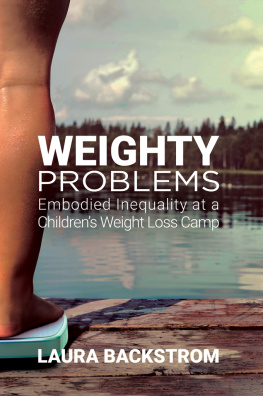
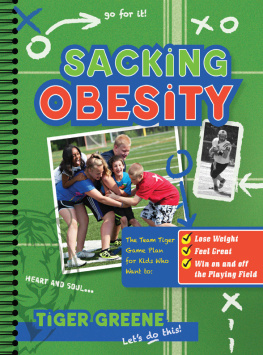
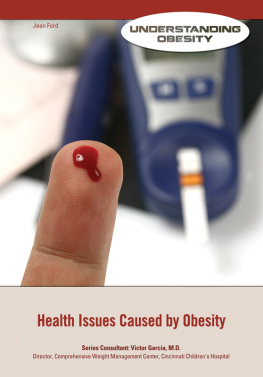
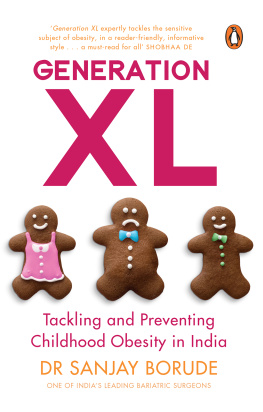



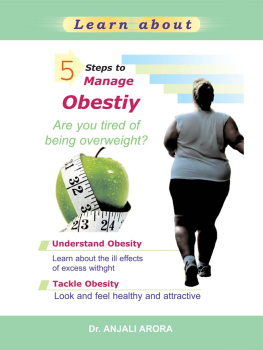


 The paper used in this publication meets the requirements of the American National Standard for Information SciencesPermanence of Paper for Printed Library Materials, ANSI Z39.48-1992.
The paper used in this publication meets the requirements of the American National Standard for Information SciencesPermanence of Paper for Printed Library Materials, ANSI Z39.48-1992.